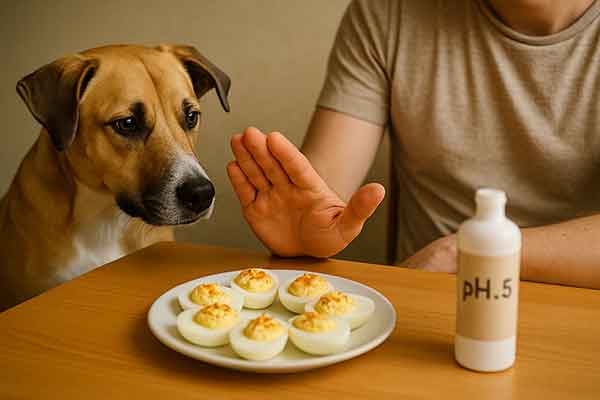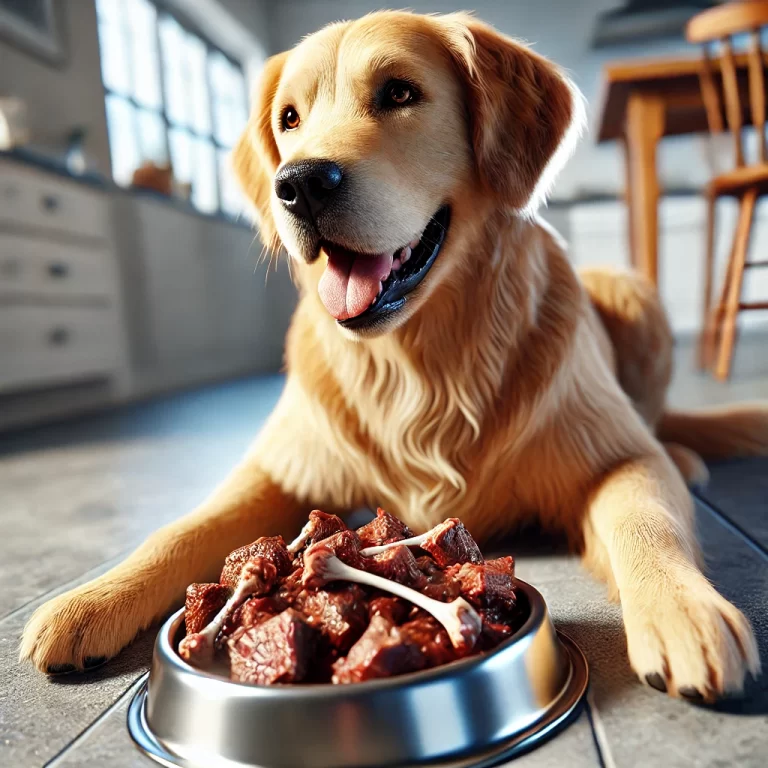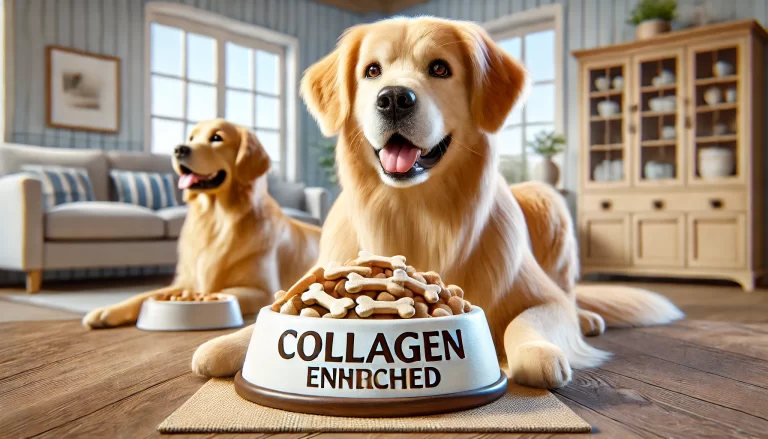Can Dogs Eat Deviled Eggs? | Safety, Benefits & Ingredients to Avoid
Deviled eggs are a classic appetizer loved by many—but should your dog get a taste too? If you’ve ever caught your pup eyeing a tray of creamy, seasoned eggs, you’ve likely wondered: Can dogs eat deviled eggs?
The short answer is: It depends. While plain, cooked eggs can be a nutritious treat for dogs, deviled eggs often contain ingredients that may not be safe or healthy. Let’s explore the benefits and risks, and how to determine whether this snack belongs in your dog’s bowl—or not.
Table of Contents
- Are Eggs Good for Dogs?
- What Are Deviled Eggs?
- Ingredient Breakdown: What’s Safe and What’s Not?
- Can Dogs Eat Deviled Eggs?
- Potential Risks of Feeding Deviled Eggs to Dogs
- Healthier Alternatives to Deviled Eggs
- Signs Your Dog Didn’t Tolerate It Well
- FAQ
Are Eggs Good for Dogs?
Yes, plain, cooked eggs are generally safe and beneficial for dogs. Eggs are packed with protein, vitamins, and healthy fats that support a dog’s muscles, coat, and immune system.
Benefits of eggs for dogs include:
- High-quality protein source
- Rich in amino acids
- Supports coat and skin health
- Contains vitamin A, riboflavin, and folate
However, the preparation method is key. Scrambled or boiled eggs without seasoning are ideal. Once added ingredients enter the mix—as with deviled eggs—things become more complicated.
What Are Deviled Eggs?
Deviled eggs are hard-boiled eggs that have been halved, with the yolks removed and blended into a creamy filling. That filling is then spooned or piped back into the egg whites.
Common deviled egg ingredients include:
- Egg yolks
- Mayonnaise
- Mustard
- Vinegar or lemon juice
- Salt and pepper
- Paprika or other spices
- Optional toppings like bacon bits, chives, or pickles
While tasty to humans, many of these ingredients are not suitable—or even dangerous—for dogs.
Ingredient Breakdown: What’s Safe and What’s Not?
Let’s examine the most common deviled egg ingredients and how they affect dogs:
| Ingredient | Is It Safe for Dogs? |
|---|---|
| Boiled egg whites/yolks | ✅ Yes — in moderation |
| Mayonnaise | ⚠️ Small amounts okay, but high in fat and not recommended |
| Mustard | ❌ No — can irritate a dog’s digestive tract |
| Vinegar or lemon juice | ⚠️ Mildly acidic — may upset the stomach |
| Salt | ❌ Excess sodium is harmful to dogs |
| Paprika/spices | ❌ May irritate the stomach or cause gas |
| Bacon bits/pickles | ❌ High in salt, fat, and artificial flavors |
As you can see, while eggs themselves are dog-friendly, most additions in deviled eggs are not.
So, Can Dogs Eat Deviled Eggs?
Technically, a small bite of deviled egg may not harm your dog—but it’s far from an ideal treat.
The mayonnaise and seasonings in deviled eggs can be too rich, salty, or spicy for a dog’s digestive system. Regular consumption or large portions may lead to upset stomach, pancreatitis, or long-term health issues.
Better to avoid deviled eggs altogether, or at least remove the filling and only offer the plain boiled egg white or yolk in small amounts.
Potential Risks of Feeding Deviled Eggs to Dogs
- Upset stomach: High-fat content from mayonnaise can cause vomiting or diarrhea.
- Salt poisoning: Too much sodium can lead to dehydration and electrolyte imbalances.
- Pancreatitis: Rich, fatty foods increase the risk in sensitive breeds.
- Allergic reactions: Dogs can develop sensitivities to ingredients like eggs, mustard, or spices.
If your dog accidentally eats a deviled egg, observe them for signs of discomfort. Most healthy dogs will be fine after a small amount, but consult your vet if symptoms develop.

Healthier Alternatives to Deviled Eggs
If you’d like to share a special eggy snack with your dog, consider these safer options:
1. Plain Boiled Eggs
Serve sliced or chopped boiled eggs with no seasoning. A protein-packed treat that’s both safe and nutritious.
2. DIY Dog-Friendly Egg Bites
- Whisk eggs with a splash of water
- Add finely chopped spinach or carrots
- Bake in muffin tins at 350°F (175°C) for 15 minutes
No salt, no fat, just wholesome goodness.
3. Freeze-Dried Egg Treats
Available at many pet stores, these offer the benefits of eggs in a shelf-stable form.
Signs Your Dog Didn’t Tolerate It Well
If your dog ate deviled eggs and shows any of the following signs, monitor closely and contact your vet if symptoms worsen:
- Vomiting
- Diarrhea
- Lethargy
- Excessive gas or bloating
- Loss of appetite
- Shaking or abdominal pain
FAQ
Can dogs eat eggs with mayonnaise?
Small amounts of mayonnaise aren’t toxic, but the high fat content makes it a poor choice. Too much can lead to digestive upset or pancreatitis.
Are any spices in deviled eggs safe for dogs?
Most spices—especially paprika, garlic powder, or mustard—should be avoided. Stick to plain ingredients when feeding your dog.
Can dogs eat egg salad or deviled egg dip?
Both are usually mixed with mayonnaise, onions, or seasonings that aren’t safe for dogs. Avoid giving these foods to your pet.
What should I do if my dog eats a deviled egg accidentally?
Monitor for symptoms. If only a small amount was eaten, your dog will likely be fine. Call your vet if you notice vomiting, diarrhea, or lethargy.
Are boiled eggs better than deviled eggs for dogs?
Absolutely. Boiled eggs (without salt or seasoning) are safe and offer great nutrition in moderation.
Conclusion
So, can dogs eat deviled eggs? It’s best not to offer them, especially not as a regular treat. While a tiny taste may not cause harm, the added fats, spices, and salt make deviled eggs far from ideal for dogs.
If you want to share eggs with your furry friend, stick to the plain, boiled variety. When in doubt, always consult your veterinarian before introducing new foods to your dog’s diet. Your dog’s health and happiness are worth more than sharing that fancy appetizer!



